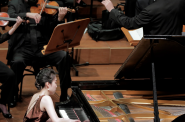New York Polyphony Comes to Town
Their first appearance in Milwaukee features 15th and 16th-century Franco-Flemish and Spanish music.
Grammy-nominated New York Polyphony, a men’s vocal ensemble founded in 2006, will open the 2023-24 Early Music Now season on Saturday, Oct. 21. The program, “And the Sun Darkened,” includes music by 15th and 16th-century Franco-Flemish and Spanish composers, as well as two more recent works.
The performance is the first in Milwaukee by New York Polyphony, whose core repertoire includes Renaissance and Medieval music as well as works by living composers. Members of the group are Geoffrey Williams, counter-tenor; Steven Wilson, tenor; Andrew Fuchs, tenor, and Craig Phillips, bass-baritone.
As a group, the compositions on the program illustrate principles of imitation, in which a phrase of melody and text is introduced by one voice and repeated and elaborated upon in turn by each voice part. This technique, developed by composers of the High Renaissance, results in especially rich expressions of text.
The texts of the works on the program invoke Biblical themes of loss, lament, and suffering. Meditations on the Passion and Dead Christ by Spanish composer Loyset Compère (c. 1445-1518) opens and closes the program. The final work, Officium de Cruce, is a nine-part motet based on the Hours of the Cross, recounting the chronology of Christ’s crucifixion.
Three pieces interpret the Lamentations of Jeremiah, historically used by the Christian Church as devotions during Holy Week. These poetic passages, which respond to the destruction of Jerusalem in 586 BCE, provide “a treasure trove of text,” according to the ensemble. Grouped in five chapters in the Old Testament Book of Lamentations, the poems are structured as acrostics, with the first letter of the Hebrew alphabet beginning the first verse, the second letter in the alphabet beginning the second verse, and so on. Settings of the Lamentations by Francisco de Peñalosa (1470-1528) and Thomas Crecquillon (c. 1505-1557) vocally interpret both the Latin poem and the Hebrew vowels in what tenor Steven Wilson calls “beautiful and florid Renaissance polyphony.”
The third setting of Lamentations was written by Norwegian composer Andrew Smith (b. 1970). He has had a long affiliation with New York Polyphony, and his music is credited by founding member Craig Phillips as teaching the group “how to communicate with each other, balance our timbres, and sing with uniformity of purpose.” Smith wrote the Lamentations to memorialize his father, who died in 2020. Wilson characterizes the composition as “intensely moving and quite stunning.”
The inclusion of the Smith piece and a setting of Psalm 22 by Estonian composer Cyrillus Kreek (1889-1962) illustrates New York Polyphony’s interest in contemporary musical interpretations of ancient writings. These compositions give audiences new ways to appreciate the intensity of the texts, Wilson said.
“And the Sun Darkened” will be performed at 5 p.m. Saturday, Oct. 21, at St. Joseph Chapel, 1501 S. Layton Blvd. Tickets are available online and at the door. Concert-goers are invited to attend a pre-concert talk by members of the ensemble at 4 p.m. in St. Joseph Hall.
If you think stories like this are important, become a member of Urban Milwaukee and help support real, independent journalism. Plus you get some cool added benefits.
Preview
-
PianoArts Festival Features Rising Stars
 May 28th, 2024 by Michael Barndt
May 28th, 2024 by Michael Barndt
-
Four Nations Ensemble Goes For Baroque
 May 13th, 2024 by Michael Barndt
May 13th, 2024 by Michael Barndt
-
Mozart on Prospect Avenue
 May 9th, 2024 by Martha Brown
May 9th, 2024 by Martha Brown



















